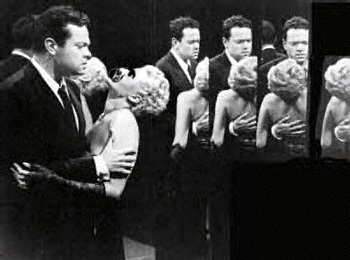|
|
 I I
Although
Graham Greene wrote the screenplay for The Third
Man, Carol Reed’s 1949 masterpiece, Orson
Welles actually wrote the movies’ most famous
lines, spoken by Harry Lime.
"In
Italy for thirty years under the Borgias they
had warfare, terror, murder and bloodshed, but
they produced Michelangelo, Leonardo da Vinci
and the Renaissance. In Switzerland, they had
brotherly love; they had five hundred years of
democracy and peace -- and what did they produce?
The cuckoo clock."
The
meaning of the quote is clear: if everything is
orderly, then nothing is going to occur. Comfort
stifles human freedom and creativity, history
offers no prizes for neatest culture. Perhaps
history offers prizes for the wrong things, but
in any event, people are only interested in the
remarkable. Why? So that they might corrupt it
and drag it down to their level.
II
Nietzsche
knew about individuality, creativity and the desires
of the crowd. For Nietzsche, the individual is
someone who doesn’t care what others think.
That is why, even though he hated Wagner, Nietzsche
knew that his view was irrelevant, what mattered
was Wagner’s view: "Enough that his
life is justified before itself." Some days,
for some people, that kind of self-regard sometimes
seems achievable.
III
Harry
Lime was a criminal, a black marketeer of penicillin
who caused injuries so revolting that Reed’s
camera would not show them, but he also put the
case against modernity very neatly. The ancient
Chinese curse, "may you live in interesting
times," gets turned around by Welles, and
Nietzsche, to become a wish for a loved one --
but, again, only if you are one of the all-too-few
people who are doing the interesting things that
make the times interesting, or if you are looking
at the times from afar. For everyone else, except
us, the curse still has teeth.
IV
We
now live in an "interesting time," but
we are also comfortable. The current central war,
the war on terror, is the first war in human history
in which ordinary citizens of a combatant state
are still able to get exotic lettuce. There are
many theorists, of all political persuasions and
philosophical schools, who think that the supply
of lettuces, the relative restraint on political
power, the sheer comfort of our existence are
too high a price to pay. For people like Michel
Foucault and Theodor Adorno, to name just two,
we exist in a tightly-controlled world (self-disciplined
or an administered world as the case may be) and
all the lettuce in the world isn’t worth
the price of living in such a numbing void. People
feel like that sometimes, but mostly we move forward
and sometimes even enjoy ourselves. But that does
not make them wholly wrong.
V
After
all of our attacks, we were finally attacked.
So we face a difficult moment. Like our enemies,
we want to face it with a theocratic face. God,
it turns out, is an American. Just as workers
forgot international solidarity and went off to
die in the trenches during World War I, so we
have dumped modernity at the first sign of trouble.
We appear to need God to have political legitimacy,
and arugula.
VI
A
couple of hundred years ago, Western man created
the Enlightenment. An ethos (or at least the kind
of thing that a lot of intellectuals believed)
that sought to strip away all of the encrustations
of myth and superstition, especially religion,
and thus allow reason to go to work on our problems.
Our response to being assaulted by pre-moderns
has not been, "let’s use our reason!"
Instead it has been, "God (and the world’s
largest army) will allow us to exact revenge."
To win this war between civilizations, we have
dismissed our own. Plus ça change. Today,
as always, we can learn a lot from Nietzsche:
"Madness is rare in individuals - but in
groups, parties, nations, and ages it is the rule."
He would not be surprised to learn that we hold
such contempt for our own ideals - or that we
never did actually live by them.
VII
"A
people is a detour to get to six or seven great
men. Yes, and then to get around them." wrote
Nietzsche, sixty years before Welles. He was far
too optimistic.
VIII
We
might be in an era which gives us bloodshed and...cuckoo
clocks.

email
us with your comments.
|
|
 |